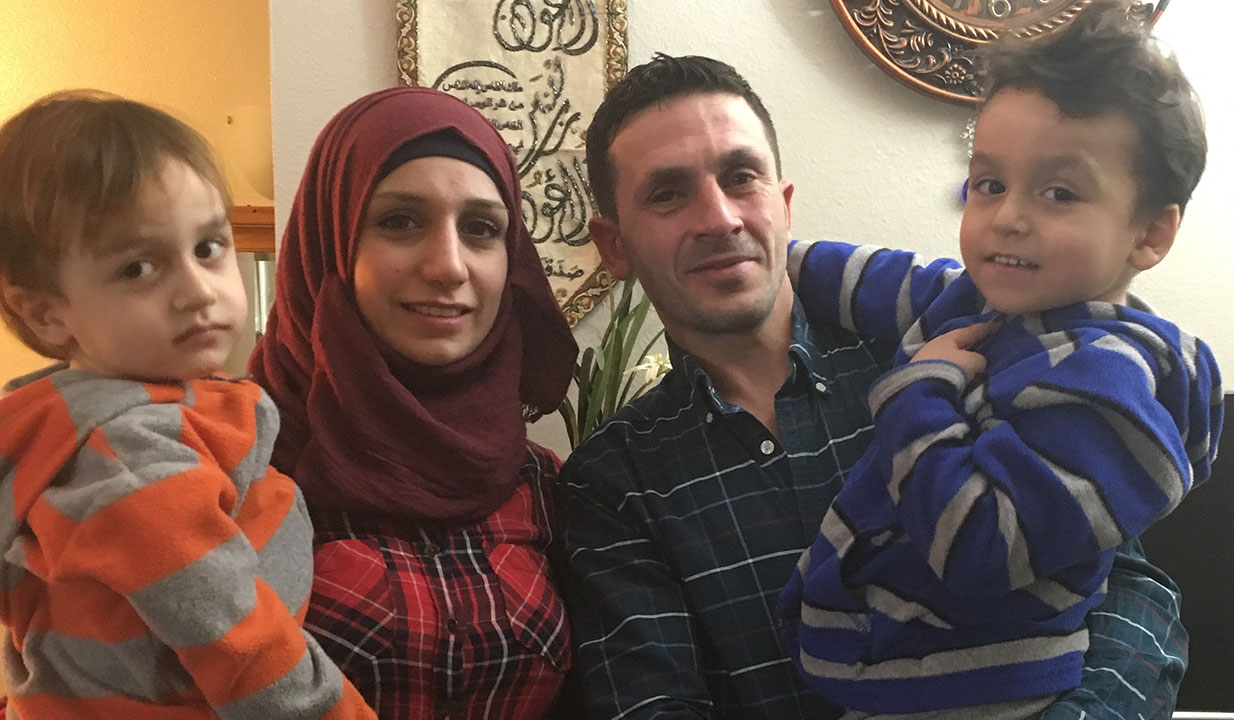
This Syrian family in Denver welcomed me, and good health depends on feeling welcome. Family photo provided by Jana
This Syrian family in Denver welcomed me, and good health depends on feeling welcome. Family photo provided by Jana
Saturday morning, I was in Los Angeles for work and got a text from my friend Jana (name changed for privacy), who is one of the first Syrian refugees resettled in Denver.
Following President Donald Trump’s executive order barring people like her from the United States, I would have understood if she had sent me a message along the lines of, “What’s wrong with you people?”
But Jana sent a photo of her 2- and 3 year-old boys in matching red sweaters with appliqued patches of white bears. Below was a note, “We miss you,” and a kissy-face emoji.
Jana loves to dress her sons like twins; that’s what she wanted to show me.
When I first met Jana’s boys in 2015, my mind conjured the photo of a drowned 3-year-old Syrian boy face-down on a Turkish beach. Jana’s kiddos got lucky; that little boy did not.
Now I know the boys for themselves, not their symbolism. They love to rough-house, feed the ducks in their back yard and race tricycles. They will eat sugar straight out of the bowl if you let them.
Ours is a time when children, in life and death, are symbols of geopolitical crisis. Families fleeing war carry the burden of our national anxieties. Welcoming the stranger is a political act.
I got to know Jana and her family because I was an in-home tutor with the English as a Second Language program for refugees at Emily Griffith Technical College. In 2015, I was disturbed by nonstop news stories of mass migration, so I signed up for the program to help empower newcomers with basic English and, at the very least, assuage my feelings of powerlessness.
In the fall, I began visiting Jana at home once a week for what I thought would be a two-hour lesson on basic survival English, such as how to navigate the hospital, grocery store and neighborhood.
Often, I ended up hanging out late into the night. Her brothers, sisters-in-law, nieces, cousins, and mother popped in and out of her apartment. The brothers fist-bumped me and taught me greetings in Arabic, the sisters-in-law greeted me with hugs and kisses on the cheek.
And they fed me. So. Much.
Mind-bogglingly delicious meals and treats punctuated most of my visits: pistachio cookies, banana and honey yogurt smoothies, homemade beet pickles and meatballs, tiny cups of cardamom-spiced espresso, hard candy, salty cheese, rice pudding and ubiquitous flat bread often accompanied by a measure of disdain, because my hosts said it wasn’t nearly as good as what they had in Syria.
I left their apartment with gifts, including a fluffy panda hat with full face and ears that I wear for warmth as I write this.
After a lesson on clothing vocabulary one evening, Jana pulled out a purple knit dress and handed it to me. She said she used to wear it to parties in Homs, a city in western Syria, and in Jordan, and that it was one of her favorites. But why give it to me? “Because… I love you!” she said.
As our lessons continued and her vocabulary increased, Jana told me more and more of her story. The family is from Homs, where they lived together in a large house with one branch of the family tree per floor.
Jana graduated high school and was beginning to study nursing when the civil war started. Her husband Hamad was a shop manager, a position he worked up to from teenage errand boy. The couple took a bus to Amman to escape the fighting while Jana was pregnant with her first son and lived three years in Jordan, undergoing a rigorous screening process and approval for resettlement. (It seems like I should mention this somewhere: the family is Muslim.)
Once, I helped Hamad fill out an application for a new job in Denver. “What was the reason for leaving your previous employment?” The application inquired. What other answer could suffice? I filled in the box with Hamad: “Civil war.”
Address and names of previous employers? Hamad said it was on Damascus Street. Jana added, with a confused look, “But it’s gone.”
This Saturday, after Jana texted me, we talked about the recent news. She said it was the same message Syrian refugees hear all over the world: you’re not welcome here.
But feeling welcome is important for national security as well as health equity. Lack of social support networks and feeling marginalized hurts health and well-being. Moreover, some research suggests “radicalized” people prone to terrorism start with unresolved feelings of grievance with society and a loss of their own significance in the world, and that acceptance and honoring other people and cultures may help prevent such situations.
I started volunteering out of a personal conviction that it’s my duty to “welcome the stranger.” But Jana’s family beat me heartily with their efforts to welcome me instead.
While their English is basic, they do know one word and say it to me constantly: Welcome.
We’d be wise to repeat it back.